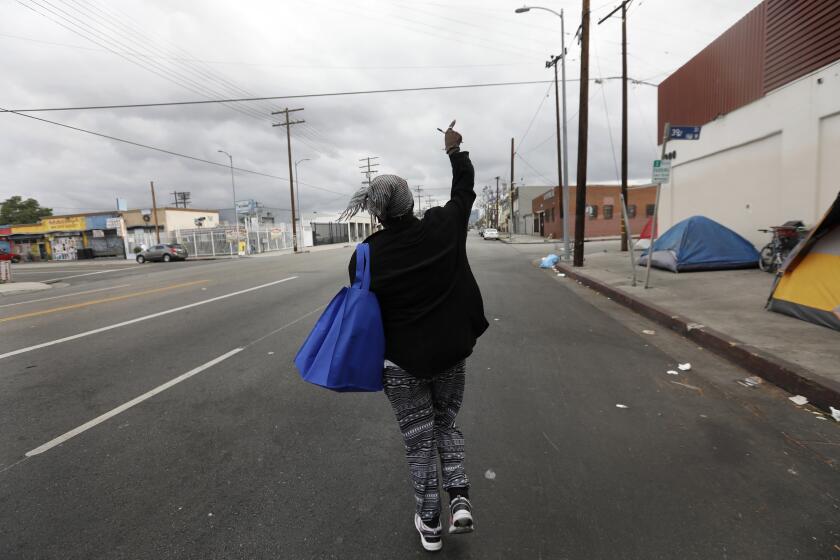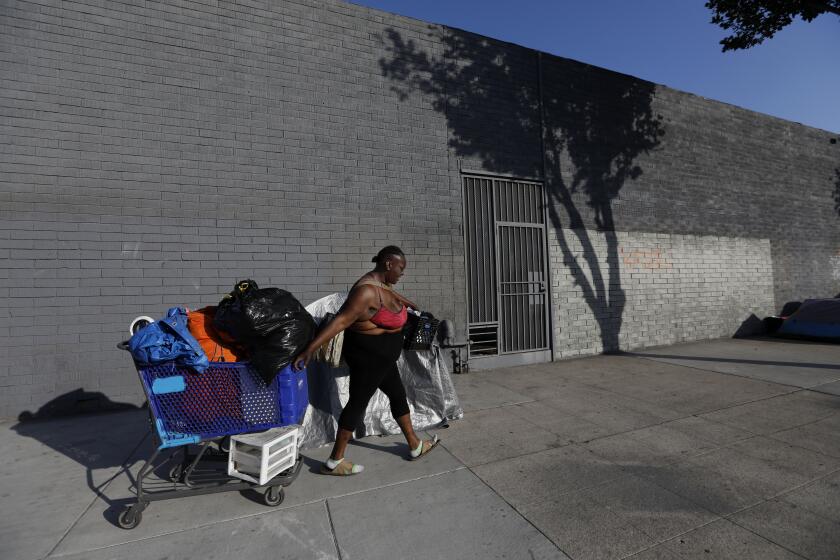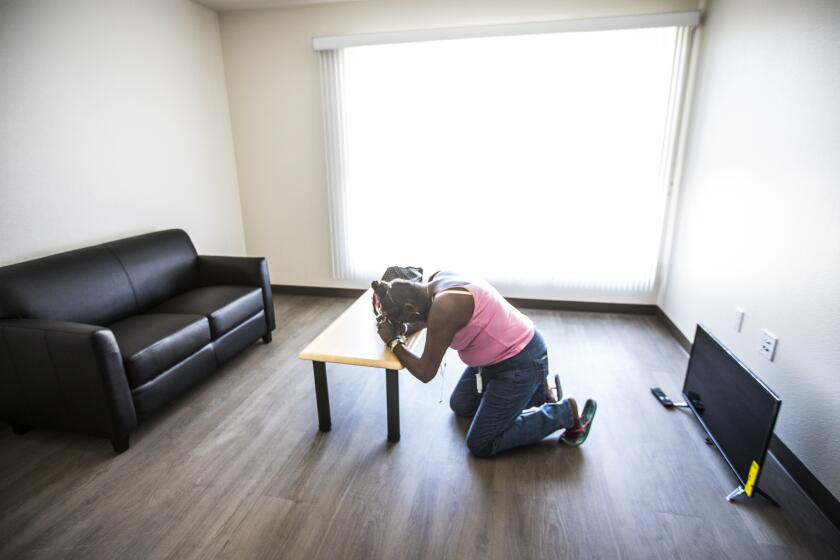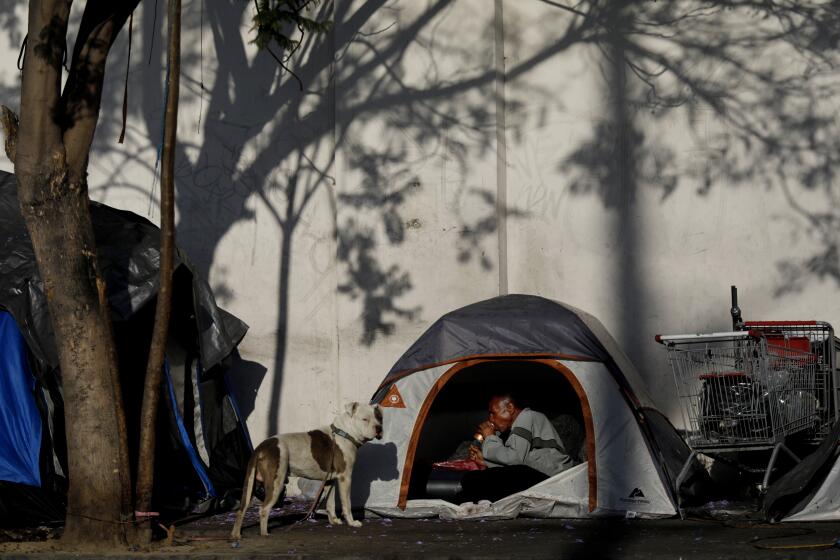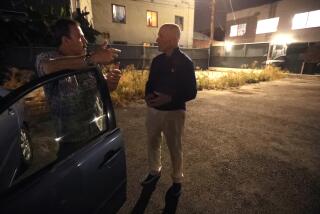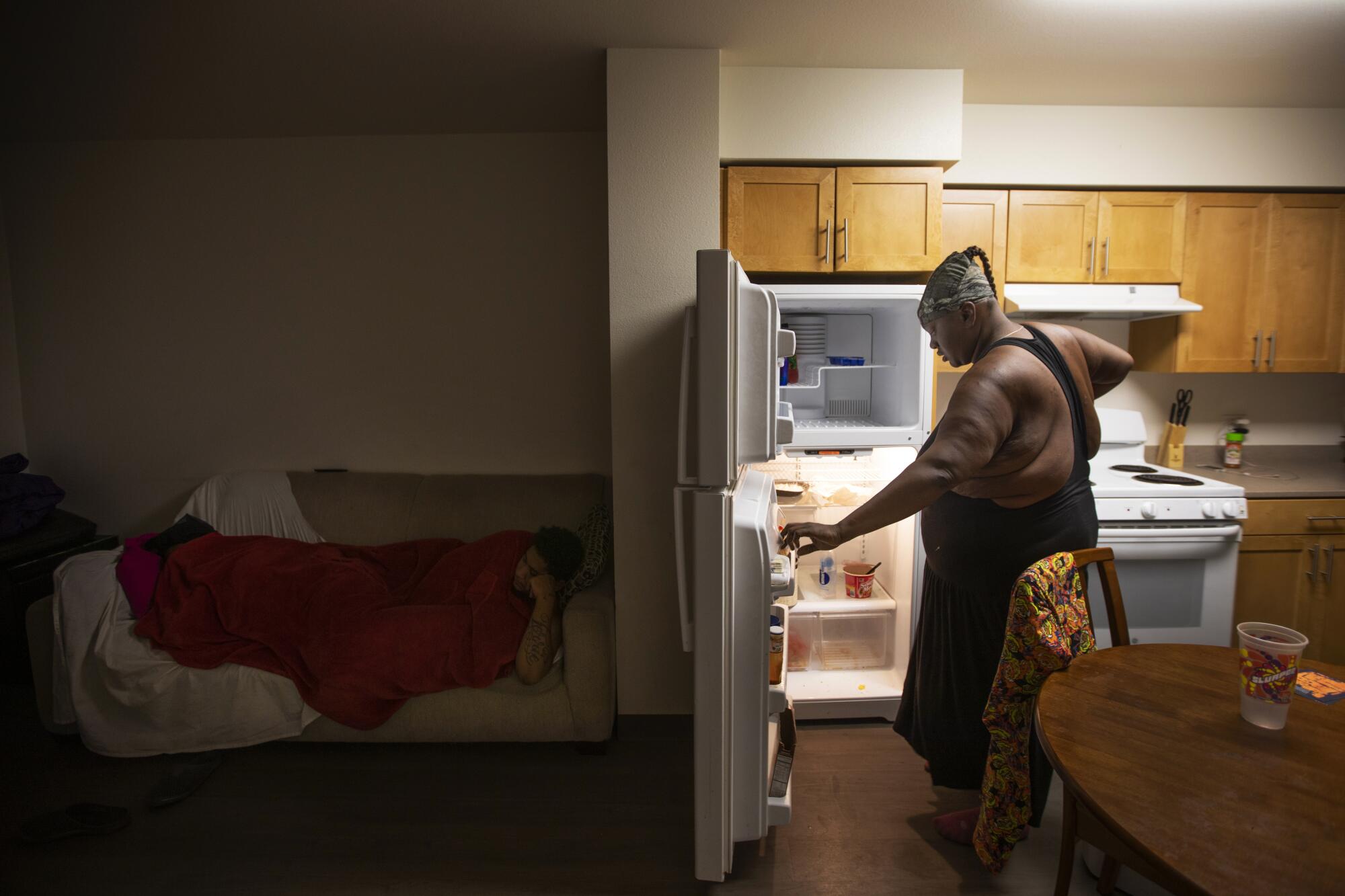
- Share via
A fire alarm pierced the quiet of a Friday afternoon.
The sound startled Big Mama, but she wasn’t worried. There had been false alarms in the building before, and she had no reason to believe this was any different.
But then she smelled smoke, and she remembered the tent fire she had escaped while living on the street, burning her hands and feet as she tried to retrieve her papers.
The alarm continued to blare.
She hurried outside. The air smelled like burning paper. It was strongest from the unit next to hers.
She banged on the door, worried about her neighbor. But there was no answer. She started to panic. Other residents gathered in the courtyard or stood in open corridors overlooking the commotion.
The fire department arrived and finally got into the unit.
The neighbor had left a pot on a lighted stove and forgot about it when he stepped out. The pot burned, and the smoke set off the alarm and sprinklers. The water and smoke damage was so extensive that Big Mama worried she might have to leave her apartment.
“Lord, I don’t want to go back out on the streets again,” she recalled thinking, quick to imagine the worst.
But property management soon determined that her unit was safe, and she could stay, even as crews began to tear the damaged unit down to the studs.
::
Big Mama, 51, was just settling in herself. She had decorated her unit with two sofas, end tables and lamps. Her television sat on another small cabinet adorned with Minnie and Mickey Mouse dolls and a print of Da Vinci’s “The Last Supper.”
A small devotional table was laid out with spiritual books, “When Christ Comes” and “What Can the Bible Teach Us?” Big Mama’s Bible was open to the 23rd Psalm.
The Lord is my Shepherd; I shall not want.
In keeping with Scripture, she went to church on Sunday and accepted donations from her friends. Most of her furniture came from a local nonprofit, and her groceries from the St. Margaret’s Center’s food bank in Inglewood.
“Not too many people get a second chance,” she said.
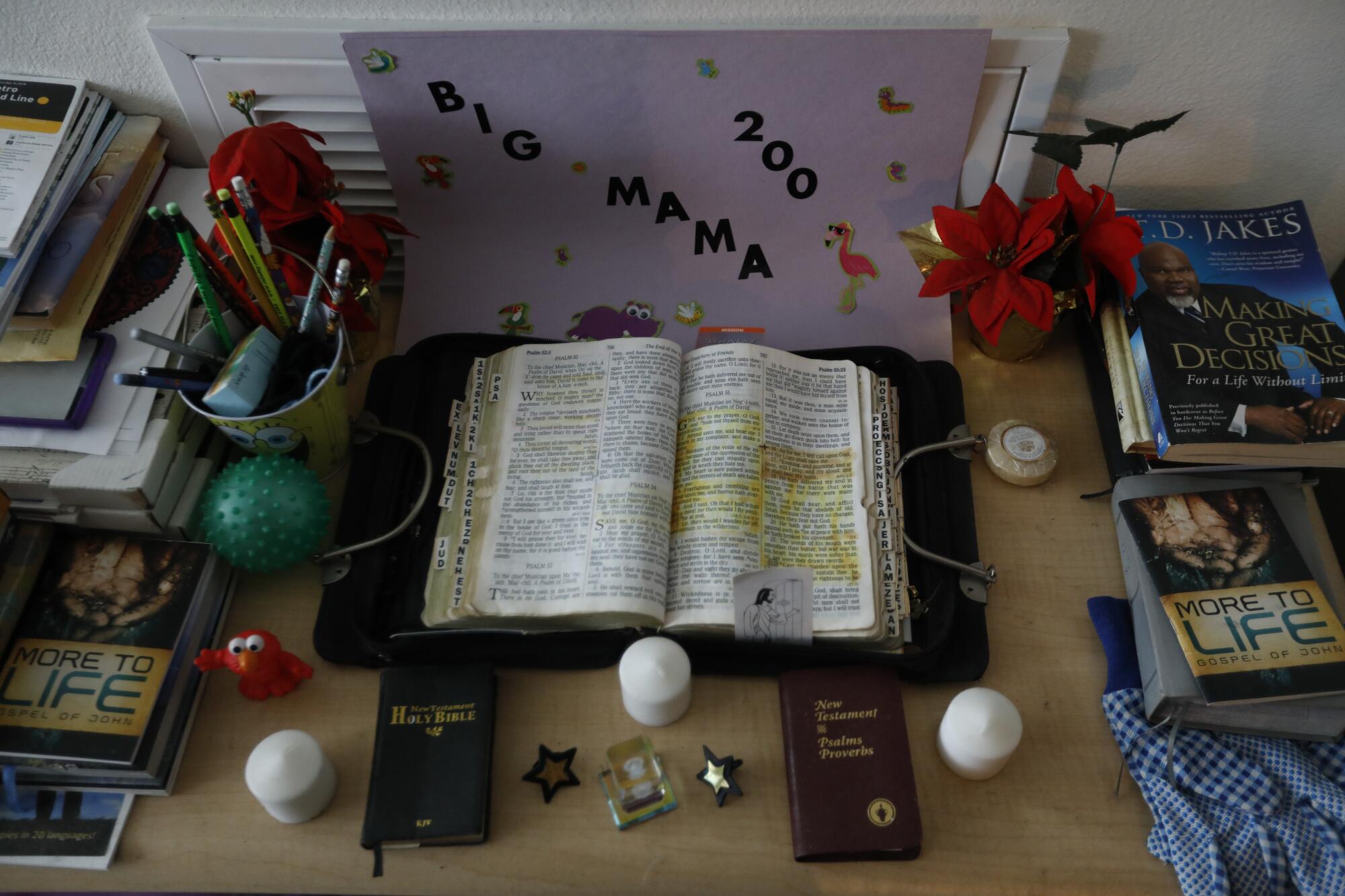
One afternoon, she sat in her living room with her friend Top Shelf. The television was on, the reception patchy.
Top Shelf, 46, once lived in a tent next to Big Mama’s. Her apartment was downstairs and had a more minimalist look, which made it easier when her young grandchildren visited.
She too had a devotional table, and beside her Bible were baby shoes, candy from Chuck-E-Cheese and greeting cards that a boyfriend had sent. The messages — “Thinking of you,” “Happy Valentine’s Day,” “In Sickness and in Health” — were decorated with pictures of a devil and an angel in carnal embrace.
The two women drank their beer and malt liquor and reflected on their new lives. “It feels like home,” Big Mama said. “It’s quiet and peaceful.”
Top Shelf was more pragmatic. “I’m good,” she said. “Just let me smoke my bud and drink my beer.”
The doorbell rang.
X smiled as he walked in holding a Big Gulp. He had been in his apartment for a week, hauling in eight plastic bins, five duffel bags and a milk crate.
He never got the rest of his belongings because, while he was hauling, someone set fire to his tent.
His real name is Duanne Hardaway. His street name — X, short for XL — comes from his size. He was the last person to leave Broadway Place.
After 10 months — February through November — and the efforts of dozens of social workers, the program known as Encampment to Home had ended. A few individuals remained to be housed, but 68 men and women, once living on the streets of South Los Angeles, called the two apartment buildings home.
Encampment to Home cost taxpayers $850,000, which covered outreach work, counseling, data analysis, the logistics of the move and administrative costs. The money came primarily from Measure H, a sales tax increase that over 10 years raises an estimated $355 million annually for homeless services.
The buildings, which had 160 units, cost nearly $60 million, including acquiring the land. Financing was in place before Los Angeles city voters approved Proposition HHH, a $1.2-billion bond for affordable housing.
At a time when homelessness was emerging as the city’s most intractable social problem, Encampment to Home was called a success by its organizers for cutting through bureaucracies that had slowed similar efforts in the past.
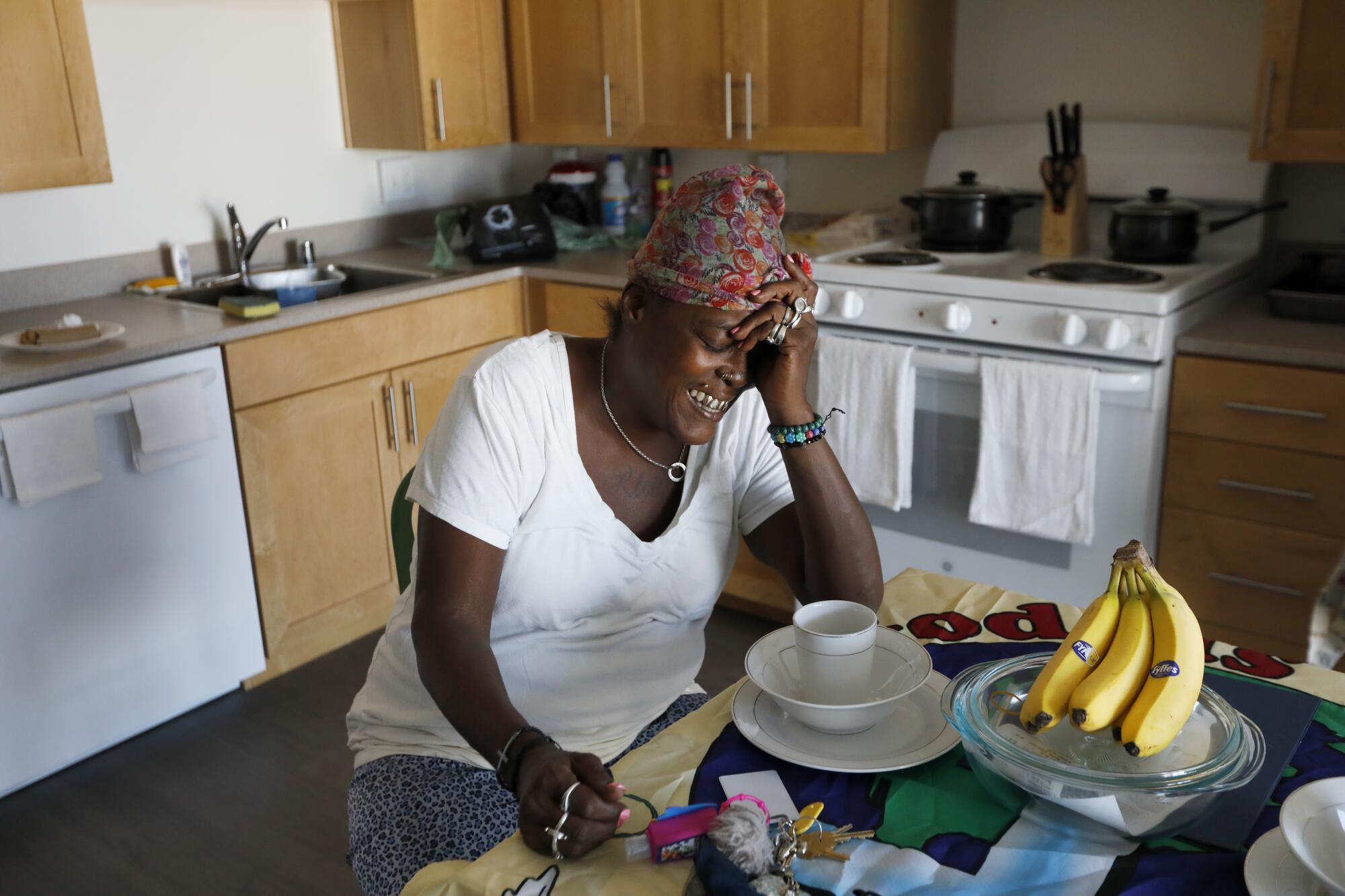
But for Big Mama, the question of the program’s success hardly mattered. Her friends and neighbors were off the streets, but she still worried about them.
The fire was just one example of how difficult this new life could be for them.
Some residents brought shopping carts filled with trash from the neighborhood — baby strollers, car seats, buckets, books, ropes, clothes, plastic Styrofoam cup lids — into their units.
One kept about 20 bicycles in his apartment for parts and repairs.
Another strung up a sheet in his living room that was reminiscent of a tarp in an encampment.
And these were a few of the minor problems. Greater troubles lay ahead.
::
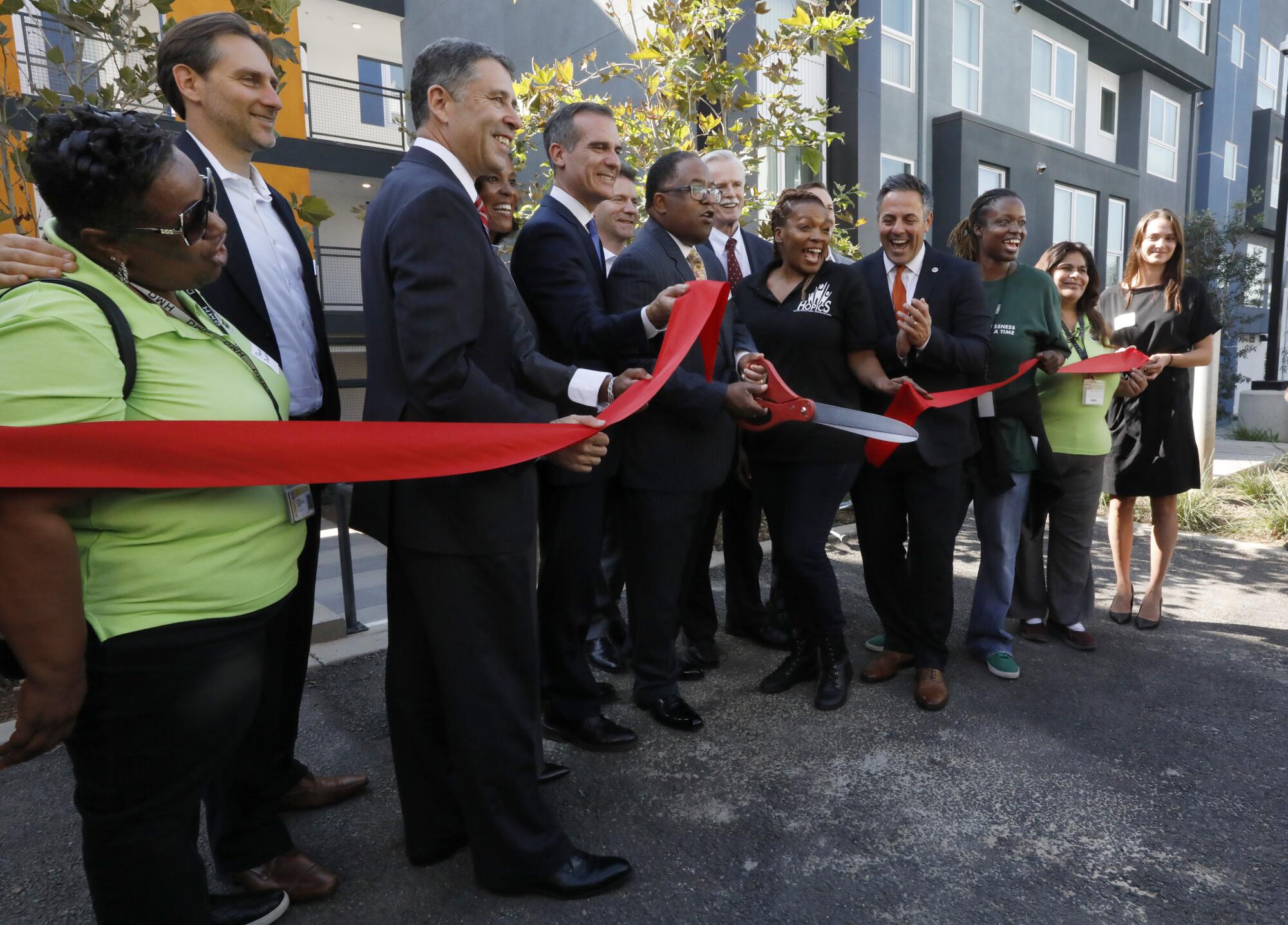
On a late October morning, property management raised an open-sided tent in the parking lot between the two apartment buildings for a grand opening. Politicians, including Mayor Eric Garcetti, sat in folding chairs out of the sun along with outreach workers and administrators.
For the occasion, Big Mama had done her hair in braids and wore a broad smile. She stood at a distance from the ceremony with Top Shelf.
County Supervisor Mark Ridley-Thomas served as master of ceremonies. “This has been 21 months in the making,” he said, “and you should be proud of what you have done.”
City Councilman Joe Buscaino spoke next. The apartments had been built in his district, and he cited the resistance City Hall faced in opening other housing projects for homeless people: one in Koreatown, another in Venice.
Despite voters approving massive new spending, residents were mounting vigorous opposition over the construction of shelters in their communities.
Finding a place for the homeless to live in the city was proving difficult.
“I pray to God,” Buscaino said, “for the courage to endure the pushback we face when proposing homeless solutions.”
Garcetti stepped to the lectern. He encouraged “each of us to put down our territoriality. You see and feel the spirit of a city that will not die down while this crisis washes over us. We will bring an end to homelessness in Los Angeles.”
After a ribbon-cutting and photographs, Garcetti headed toward his car and driver. Big Mama intercepted him.
She shook his hand. “Thank you,” she said. “I’ve been homeless for nine years.”
He then gave her a hug and clasped his hands on her shoulder. “Welcome home,” he said, and smiling together, they turned shoulder to shoulder and posed for the cameras.
“Thank you so much,” she repeated.
As he turned away, Big Mama gave out a big laugh and put up two thumbs, beaming with excitement.
Just months ago, she had been living on the street, frustrated, forgotten and overlooked, and now she had met the city’s most important politician.
Heading back to her apartment, she had to be reminded of his name, but that hardly mattered. She never could have imagined it happening.
“I’ll never wash this hand again,” she said.
::
Keith Gaston was slowly getting used to his new home. He had lived in a tent around the corner from Big Mama on 39th Street. For nearly eight years, he had bounced from family to friends’ places before finally ending up on the sidewalk.
Keith, 54, had suffered through deaths in his family. Court records show multiple convictions from 1988 to 2011 in California and Nevada for driving an unregistered vehicle without a license, cocaine possession with intent to sell, and other offenses.
When he moved into his new apartment, he wrote in a notebook about his experiences and feelings. His first entry was short.
Today means a hole lot to me cause? Im not homeless. Aug 6 18. “Happy” Feeling good. Thank God.
But behind his happiness lurked old temptations. Two weeks later he wrote:
I need to get my strength right stop doing drugs meth live the right way Gods want me to be show more love stop talking to street girls not my kind of women Today will be my last days No more drugs Get myself together. I really miss my daughter.

At the time, his daughter Keyshanna was living in a nursing home.
Like her mother, Kathy, and her sister, Kaila, Keyshanna had cerebellar ataxia, a genetic disorder that affects the brain. Kathy had died, then Kaila when she was 21.
Seven months after Keith moved into his apartment, Keyshanna died. The grief weighed upon him.
He felt he should have done something — anything — to save them, but he knew, strong as he was, he was powerless against their fate. “Life,” he said, “is a vale of disaster.”
For Keith, survival was a battle between good and evil, and he struggled to stay on God’s side. His counselor from the People Concern tried to help, but Keith felt she was too young to understand.
One day in September, he opened his front door, shirtless and his face beaded with sweat. The window blinds were closed, and the apartment smelled of bleach. He was cleaning.
In his bedroom, he tilted the mattress on its side, and he was wiping everything down.
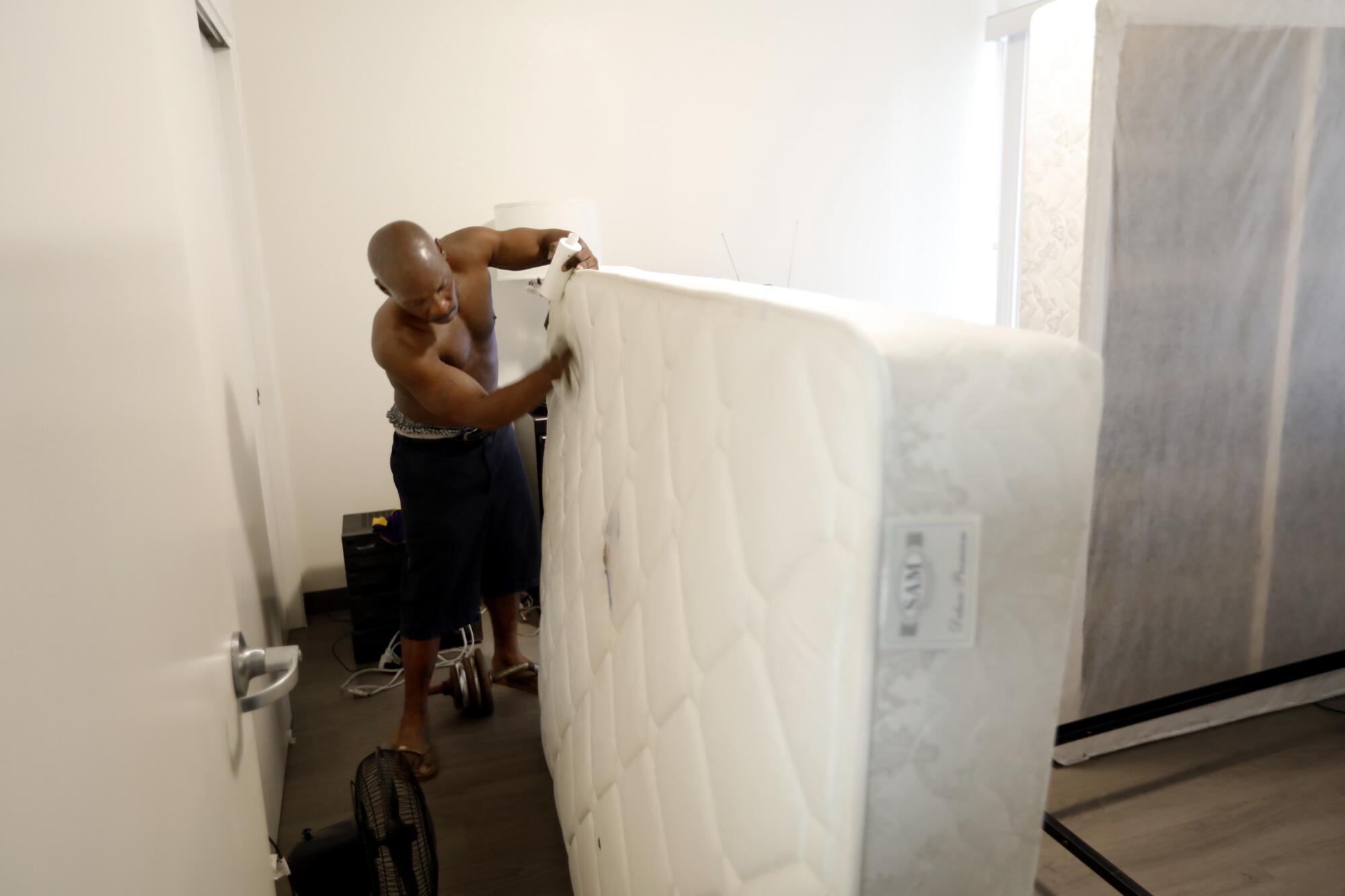
The television was on, and Tupac’s “Hail Mary” was playing on his phone, a tolling bell eerily counterpointing the opening rap.
“Godly people got to be clean,” Keith said.
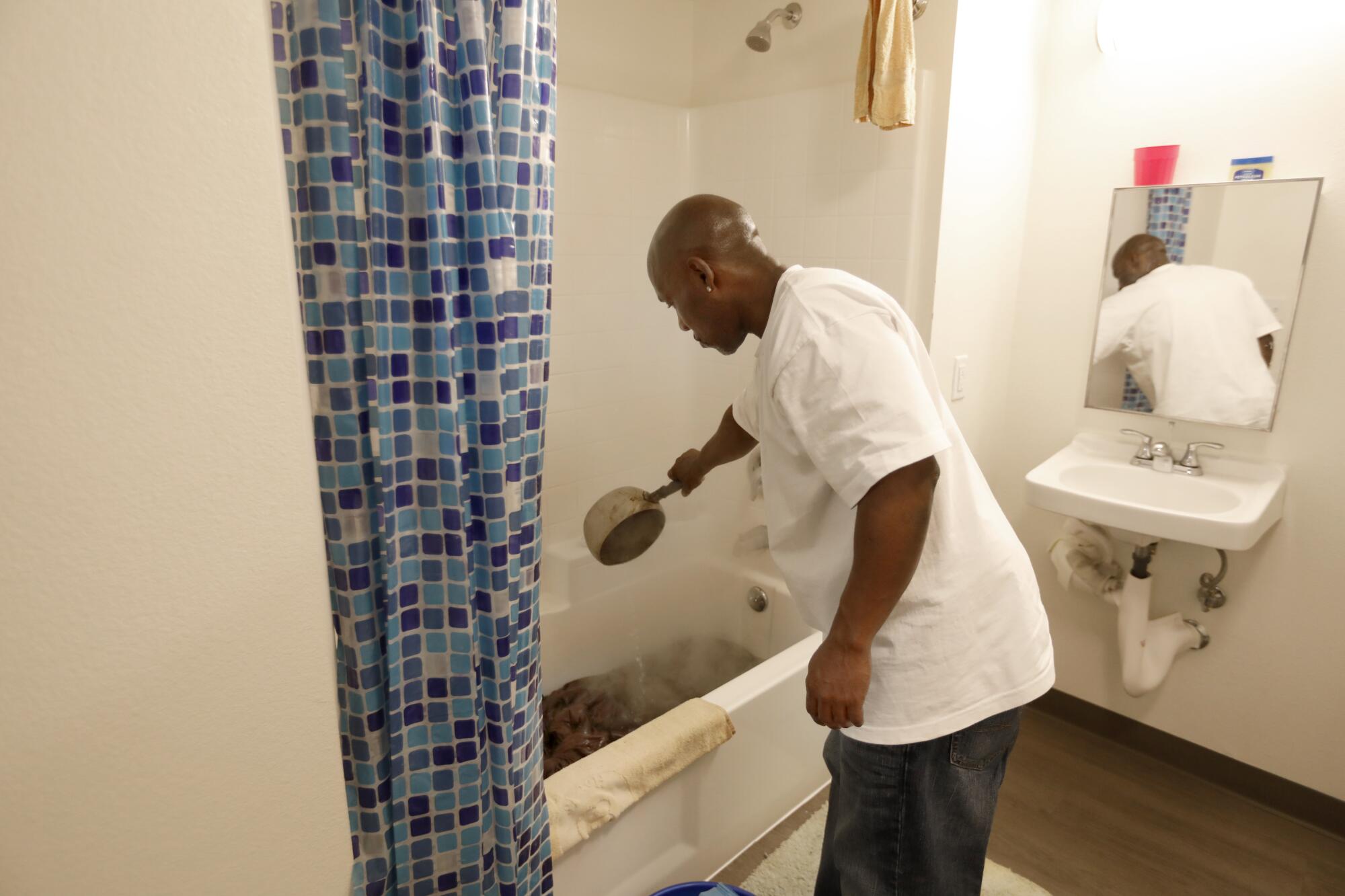
A month later, he threw away all of his bedding and clothes. He said he had noticed gray spots, like bedbugs. He kept his throw pillows in the dishwasher for fear of contamination. He ran hot water and cleaned frequently.
He was lonely in his new apartment. He said he missed friends on the street and the USC students who had brought vegetarian burritos to his tent.
But he was winning his battle against evil, following the rules that would allow him to stay in the apartment.
On the enameled metal of his stove, he had drawn a small cross and wrote “Jesus” on each side of it. Above that, taped to the wall, was a crinkled photograph of Kaila with a word balloon. She was telling him to “stay off drugs.”
“You’ve got to have the spirit of the Lord in here,” he said, “in order to run out the evil spirits.
“Who wants the wicked around?”
::

The biggest problem for Niecy was an ex-boyfriend with a machete.
One night in early January, at a little past 11, she called 911. She said the former boyfriend was banging on her door with a sledgehammer. It turned out to be the machete.
Police arrived. They had gotten to know the apartments well. In the last three months of 2018, the Los Angeles Police Department had responded to 46 reports of suspicious activities at the two buildings, some of them actual complaints including domestic violence, vehicle theft and burglary.
The officers told Niecy to get a restraining order. But she didn’t bother.
A security camera had recorded the incident, and in early February she received a letter from a law firm telling her she had 10 days to move out.
At first, Niecy didn’t understand how she could be responsible. She hadn’t let her former boyfriend into the building. That was on her neighbor, Dion Hines, with whom she had a troubled history.
She kept reading.
The letter blamed her for the man with the machete showing up at her door. It said her actions threatened the health and safety of other residents and management.
Before long, she was in tears.
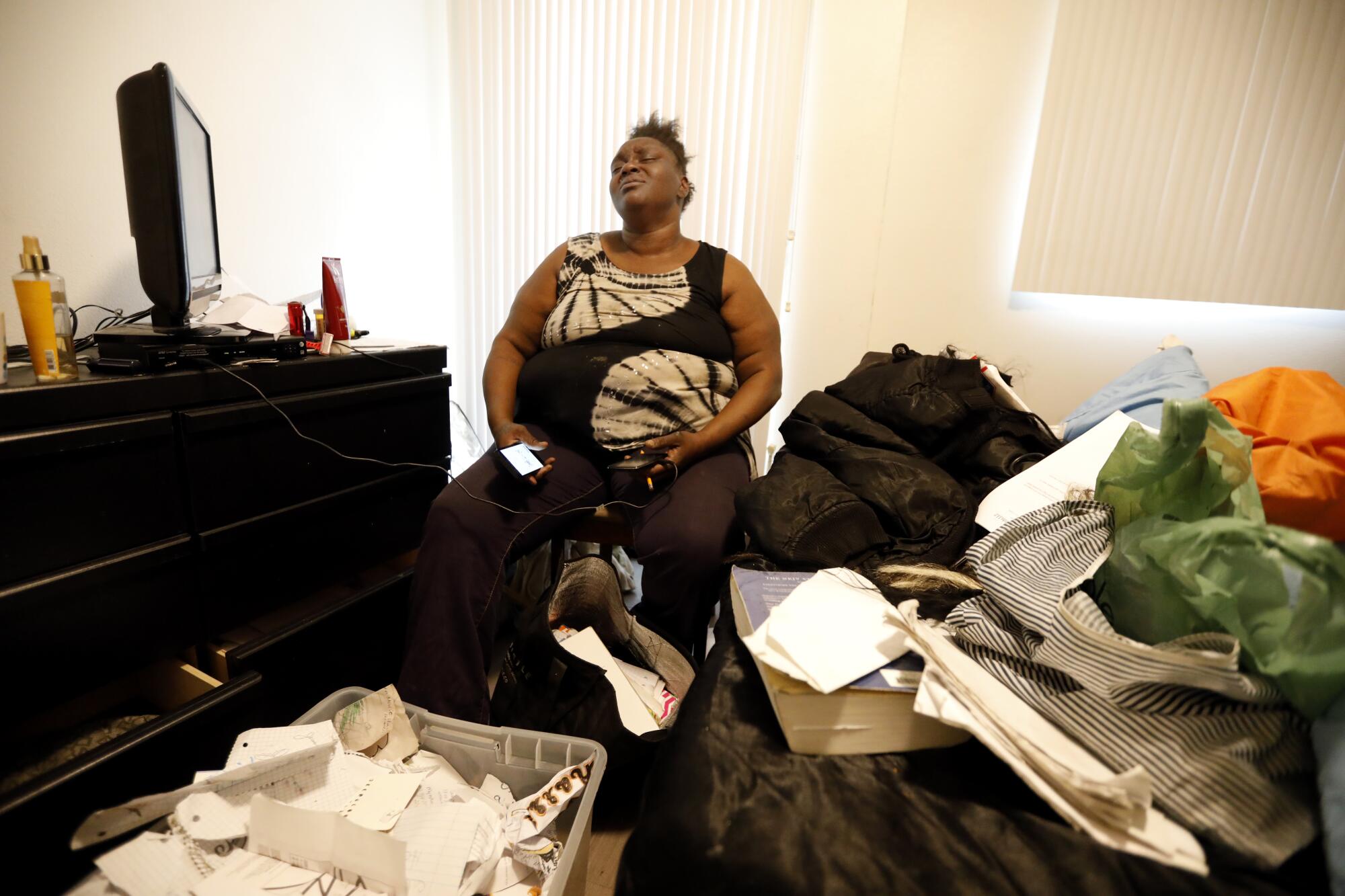
Dion had received a similar notice. It called the man with the machete his “guest.”
He was just as distraught, pacing his living room and kitchen, running his hand over his head. He had done his time on the streets. He had lived in a small tent on 39th Street before moving into the apartments, and he didn’t want to go back.
Dion, 27, had been able to connect with his 4-year-old daughter, whose picture was the wallpaper for his cellphone. “I just want to stay in my house,” he said, not certain why this was happening to him. “I just want a place for me, my daughter and my girl. I can’t do the street anymore.”
Counselors for Niecy and Dion tried to negotiate with the property management company. They succeeded for Dion, and he was eventually let off with a warning.
Niecy, who had lived on and off the streets since 2004, had a harder time. Even after property management banned her ex-boyfriend from visiting the apartments, Niecy continued to see him on the premises.
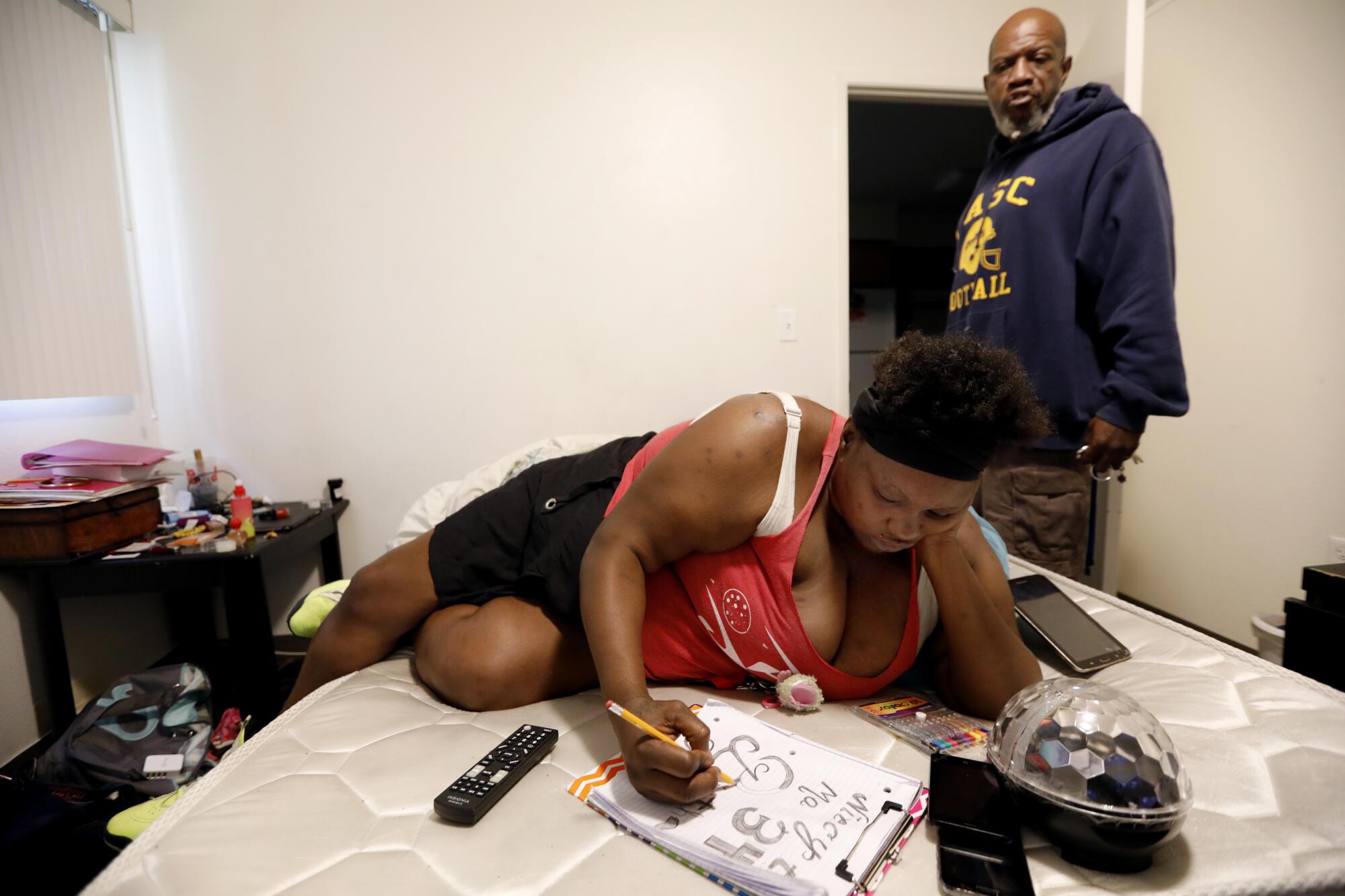
The People Concern persuaded her to relinquish her apartment voluntarily to avoid having an eviction on her record.
On her last day in the building, Niecy wept. Not only was she losing her home, but it was the anniversary of her brother’s cremation. In 2011, he was shot during a burglary at a small business on South Hoover Street. He was 19.
And tomorrow would be her birthday. She was turning 34.
Instead of getting ready for a party, she stood in the kitchen emptying cabinets and putting her food into a pillowcase for a neighbor. Just six months ago, she had been given the key to this apartment and had waved it with her fingers to celebrate.
Antoinette Monts, her counselor, knocked on the door. The People Concern had found a place for her at the Reno Motel on Washington Boulevard.

Niecy went to her bedroom and gathered her belongings. She piled everything into a large shopping cart and took an elevator down.
The Reno Motel had been renovated to provide short-term recuperative care for homeless people. Less than a month later, she was living in a tent on 39th Street, just around the corner from Broadway Place.
Six weeks later, Dion was on the street as well. He had relinquished his unit after what he said was a fight on the premises. He claimed he had been set up. The People Concern was trying to find him interim housing.
Niecy and Dion had lost a rare opportunity and once again joined the city’s vast community of homeless.
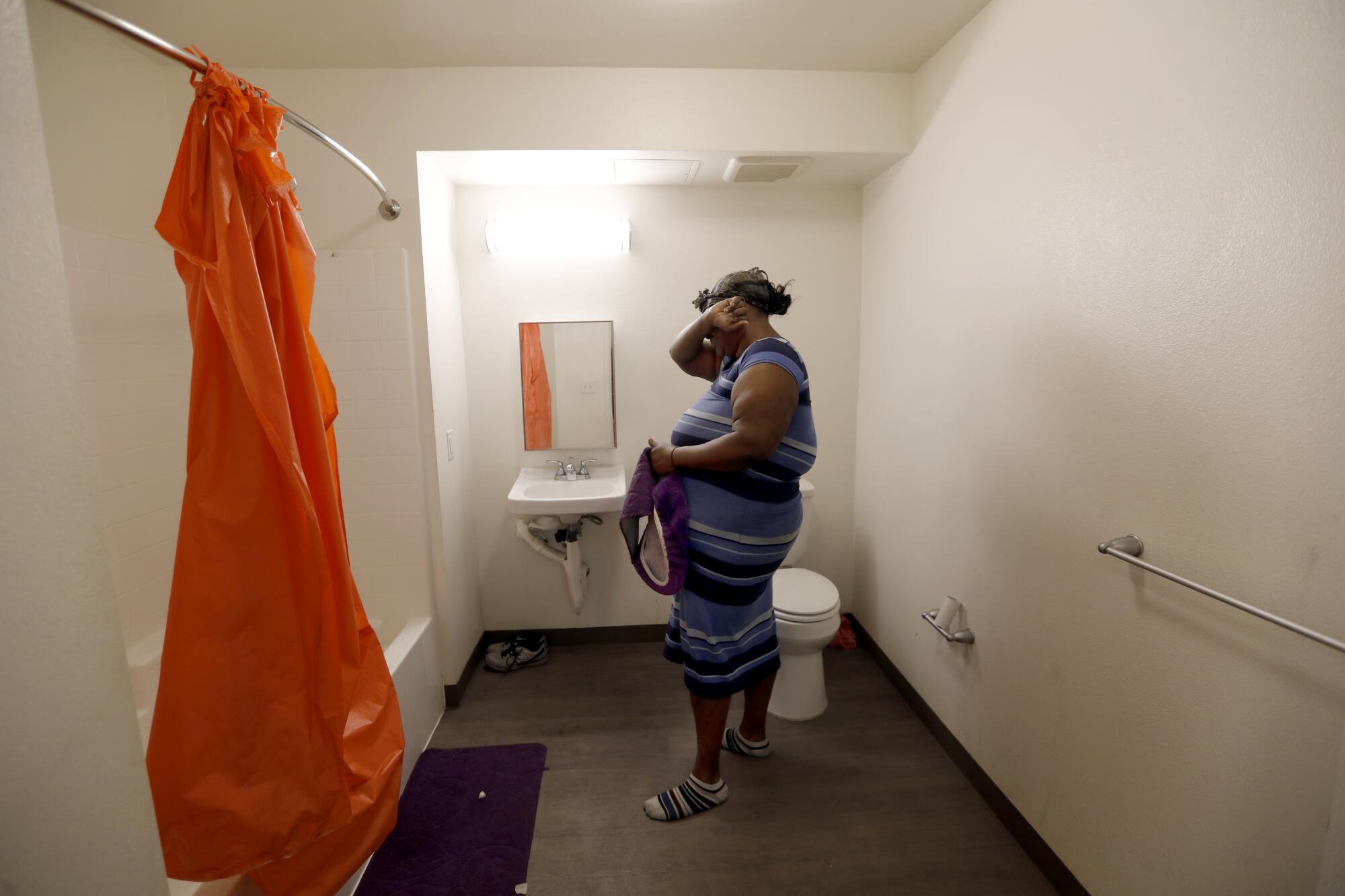
::
Big Mama felt sorry for Niecy losing her apartment but vowed not to let the same thing happen to her.
Memories of her last year on Broadway Place lingered: the car crashing into the tents, the street fight that nearly turned deadly, the heat wave and the succession of sweeps by the city’s Department of Sanitation.
Big Mama had too much to lose, as did her friend Top Shelf, who was enjoying the time she could now spend with her grandchildren.
Just inside her front door, Top Shelf still kept the block of wood that had been her protection on the street, and each morning, she cased her apartment to be sure there were no surprises.
Old habits were hard to break, but she talked with her counselor, who reminded her to take her medications, mostly the antidepressants that she kept in a purple- and-gold Crown Royal bag. She resisted.
“I ain’t going to be no zombie.”
Most important, the two women were inside, where it was safe and warm.
They never referred to Encampment to Home by its name but instead called it a blessing.
Once during an early winter storm, standing outside her apartment, Big Mama stared into the rain as it fell into the courtyard. She was quiet, thinking about the friends she’d left behind.
Some had asked if they could visit, possibly stay with her for a while, but she said no. She knew that she needed to keep her distance. She had to follow the rules. She had to look out for herself.
But her resolve brought a mix of feelings, expressed in a text she sent that afternoon.
Me and big X is crying just thinking about when we were out there in the rain but we are happy we are going to keep praying for our friends that are out there.
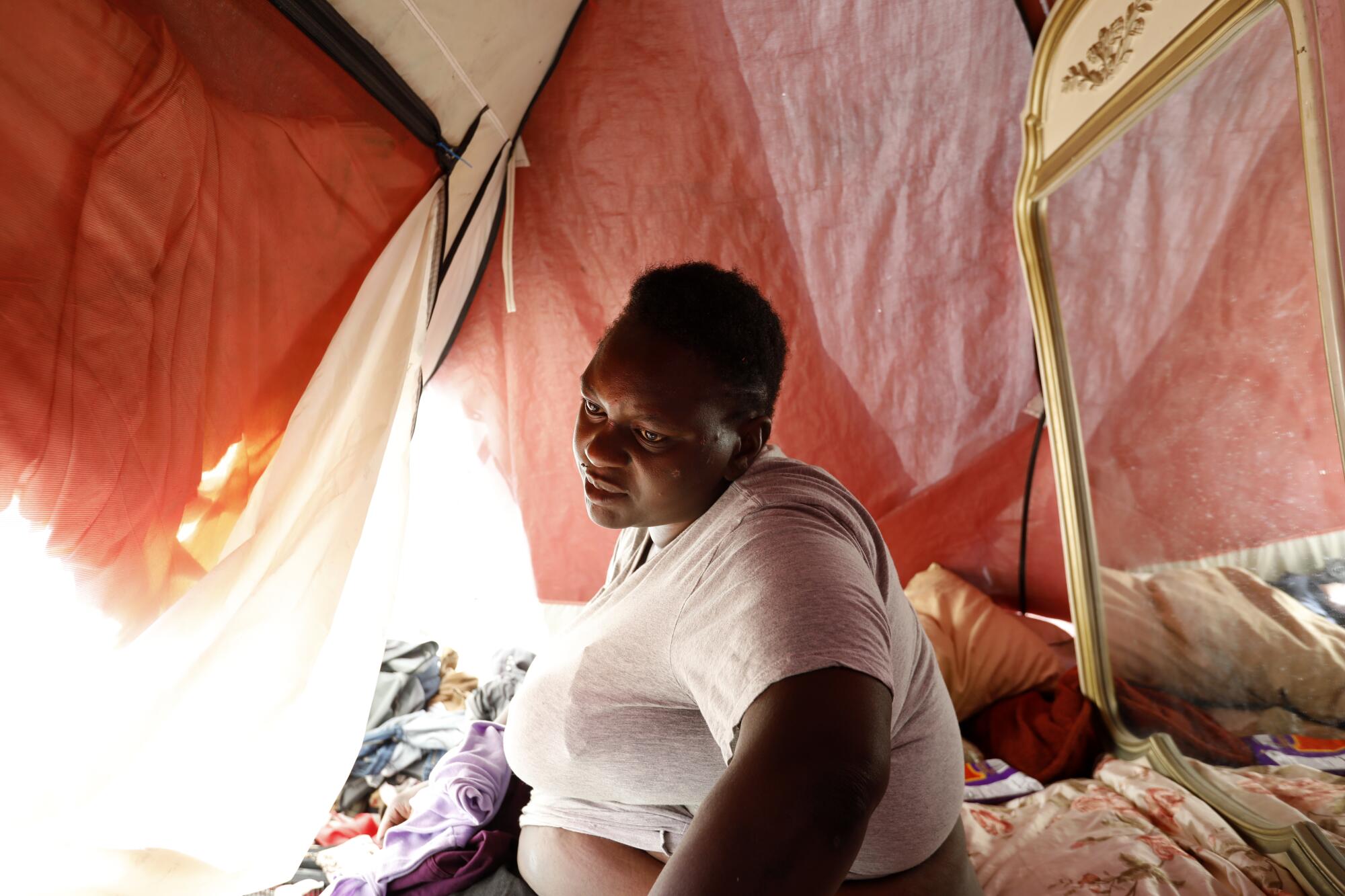
She hoped one day that she would have a chance to speak publicly about homelessness. The words would come easily to her.
“This was a long struggle for me,” she said one day. “I’ve been up, middle, and I hit rock bottom. But my God says no, no, no; I’m going to rise you back on up to the top. And he gave me what I asked, and I thank him for that.”
Big Mama continued to visit Broadway Place. She rode the bus and drank with her old friends who still lived in the neighborhood. Sitting on a planter ledge outside a business, she stared across the street to the sidewalk where her tent used to be.
A new encampment had set itself up on Broadway Place.
After months of outreach work — the efforts of multiple city and county agencies working at taxpayers’ expense to clear the sidewalk — a ragged collection of tents and tarps stood in the shade of the two purpling jacarandas that had been her front door.
More to Read
Sign up for Essential California
The most important California stories and recommendations in your inbox every morning.
You may occasionally receive promotional content from the Los Angeles Times.
